

Aga Khan Foundation Canada. Sufism. Sufism (or taṣawwuf; Arabic: الصوفية) is a branch of Islam,[1] defined by adherents as the inner, mystical dimension of Islam; others contend that it is a perennial philosophy of existence that pre-dates religion, the expression of which flowered within Islam.[2] Its essence has also been expressed via other religions and metareligious phenomena.[3][4][5] A practitioner of this tradition is generally known as a ṣūfī (صُوفِيّ).
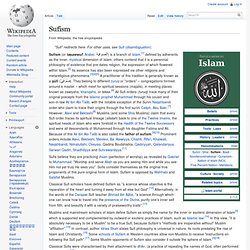
Sufis believe they are practicing ihsan (perfection of worship) as revealed by Gabriel to Muhammad: "Worship and serve Allah as you are seeing Him and while you see Him not yet truly He sees you". Sufis consider themselves as the original true proponents of this pure original form of Islam. Sufism is opposed by Wahhabi and Salafist Muslims.
Classical Sufis were characterised by their attachment to dhikr, (a practice of repeating the names of God, often performed after prayers)[19] and asceticism. Salafi movement. Tablighi Jamaat. Tablighi Jamaat (Urdu: تبلیغی جماعت, Tablīg͟hī Jamā‘at; Arabic: جماعة التبليغ, Jamā‘at at-Tablīgh; Bengali: তাবলীগ জামাত; Hindi: तबलीगी जमात; English: Society for spreading faith) is an Islamic religious movement based on the principle of the "Work of the Prophets" inviting to God in the manner of Muhammad.
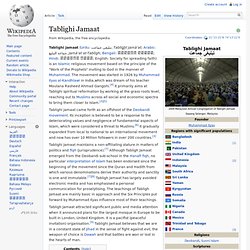
The movement was started in 1926 by Muhammad Ilyas al-Kandhlawi in India,which was dream of his teacher Moulana Rasheed Ahmad Gangohi.[4] It primarily aims at Tablighi spiritual reformation by working at the grass roots level, reaching out to Muslims across all social and economic spectra to bring them closer to Islam.[3][5] Tablighi Jamaat came forth as an offshoot of the Deobandi movement. Tabligh Jamaat attracted significant public and media attention when it announced plans for the largest mosque in Europe to be built in London, United Kingdom. History[edit] Origin[edit] Expansion[edit] Bishwa Dhaka Ijtema in Bangladesh. Muslim Brotherhood. The Society of the Muslim Brothers (Arabic: جماعة الإخوان المسلمين), shortened to, the Muslim Brotherhood (الإخوان المسلمون al-Ikhwān al-Muslimūn) is a transnational Islamic political organization which is considered a terrorist organization by the governments of Egypt, Russia, Syria, Saudi Arabia and United Arab Emirates.[1][2][3][4] Founded in Egypt in 1928 [5] a Pan-Islamic, religious, and social movement by the Islamic scholar and schoolteacher Hassan al-Banna,[6][7][8][9] by the end of World War II the Muslim Brotherhood had an estimated two million members.[10] Its ideas had gained supporters throughout the Arab world and influenced other Islamist groups with its "model of political activism combined with Islamic charity work".[11] The Brotherhood's stated goal is to instill the Qur'an and Sunnah as the "sole reference point for ...ordering the life of the Muslim family, individual, community ... and state.
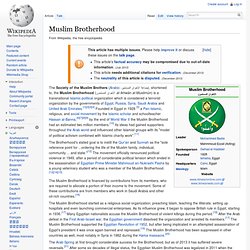
Deoband. Deoband (Hindi: देवबंद, Urdu: دیوبند, Devband) is a city and a municipal board in Saharanpur district in the state of Uttar Pradesh, India.
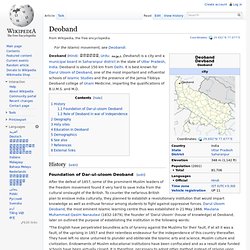
Deoband is about 150 km from Delhi. It is best known for Darul Uloom of Deoband, one of the most important and influential schools of Islamic Studies and the presence of the Jamia Tibbiya Deoband college of Unani Medicine, imparting the qualifications of B.U.M.S. and M.D. Mu'tazila. Muʿtazilah (Arabic: المعتزلة) is an Islamic school of theology based on reason and rational thought[1] that flourished in the cities of Basra and Baghdad, both in present-day Iraq, during the 8th–10th centuries.
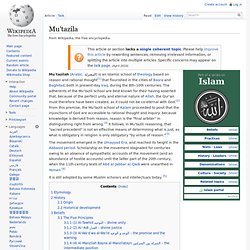
The adherents of the Mu'tazili school are best known for their having asserted that, because of the perfect unity and eternal nature of Allah, the Qur'an must therefore have been created, as it could not be co-eternal with God.[2] From this premise, the Mu'tazili school of Kalam proceeded to posit that the injunctions of God are accessible to rational thought and inquiry: because knowledge is derived from reason, reason is the "final arbiter" in distinguishing right from wrong.[3] It follows, in Mu'tazili reasoning, that "sacred precedent" is not an effective means of determining what is just, as what is obligatory in religion is only obligatory "by virtue of reason. Pan-Islamism. Pan-Islamism (Arabic: الوحدة الإسلامية Turkish: İttihad-ı İslam) is a political movement advocating the unity of Muslims under one Islamic state – often a Caliphate[1] – or an international organization similar to a European Union with Islamic principles.
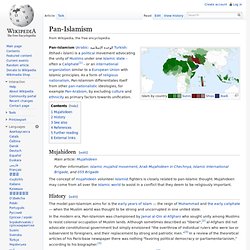
As a form of religious nationalism, Pan-Islamism differentiates itself from other pan-nationalistic ideologies, for example Pan-Arabism, by excluding culture and ethnicity as primary factors towards unification. Mujahideen[edit] The concept of mujahideen volunteer Islamist fighters is closely related to pan-Islamic thought. Mujahideen may come from all over the Islamic world to assist in a conflict that they deem to be religiously important. Islam, the Quran, and the Five Pillars All Without a Flamewar: Crash Course World History #13.